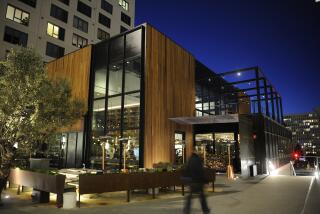Delivery start-up Schlep & Fetch runs out of cash, shuts down and pays drivers fraction of what they’re owed
- Share via
Schlep & Fetch, which delivered food from Yelp Eat24 orders and documents from movie studios and law offices, ceased operations in recent days after running out of money.
At its peak last fall, the Los Angeles courier start-up had 140 drivers fulfilling 15,000 orders a month from the Westside to downtown. The company, founded in 2011, had raised nearly $500,000 from wealthy individuals, including those in the investment group Tech Coast Angels.
“We fought so long and hard to not get to this place,” said Bryson Strauss, who co-founded the company with his wife, Ashley Eaton. “It’s sad to be at this place right now. This was a family business.”
The couple, who had been running an arts media company, decided to start the delivery service after being in a pinch one night for fresh baby supplies. Delivery companies such as DoorDash, Postmastes and Instacart hadn’t launched yet. Uber’s Eats service also wasn’t around.
But Strauss says Schlep & Fetch became hamstrung when competitors emerged. His firm was making 5,000 deliveries a month, but it struggled to raise money for advertising. The newer companies received multimillion-dollar investments.
“It was more challenging to raise money on a model that works than just having a concept, because people can’t seem to dream as big when you’re already in operation,” Strauss said.
Without money, Schlep & Fetch relied on word of mouth to pick up new users seeking the occasional delivery — say, ferrying a forgotten lunch to a child’s school or grabbing something from Target. In the meantime, the company generated most of its business through partnerships with Eat24, Olo.com and other online food ordering services.
The food orders brought the company just $2 each, with drivers getting about $4. Non-partner deliveries would bring the company at least $12 and drivers $13.
To grow without investment, Schlep & Fetch needed more food deliveries. But getting a commensurate number of drivers also would have required more marketing dollars.
Strauss sought to sell the company in recent months but found no workable deals. And he was saddled with debt.
It’s a “low-margin, high-intensity, high anxiety” business, he said. “We got squeezed.”
The company plans to split remaining cash evenly among about 100 drivers and its 10 employees. As a result, drivers received letters Wednesday saying they would be paid a percentage of what they are owed. For one driver, that amounted to a pay-out of 25 cents on the dollar, according to documents seen by the Los Angeles Times.
“I know this is frustrating but it is, unfortunately, a reality we are facing,” Strauss wrote in the note.
Archollis Johnson, who’s driven for the company for four years, said he was disappointed with the lack of warning about the financial troubles. He said he’s out more than $800, or two-thirds of his monthly rent.
“There was absolutely no indicator,” Johnson said, adding he plans to find a new line of work. “You felt they cared about us — at least that’s what I thought until this all happened.”
In an interview, Strauss said he’s working to make the wind-down as smooth as possible by introducing drivers and partners to rivals. Investors won’t get any payout.
Strauss said he’s considering ideas for his next start-up. It won’t be in delivery.
“It’s hard when someone like Uber is charging such low prices and burning through cash,” he said. “How long will they argue that they’re growing and that justifies it? You’ll have happier customers and drivers if they can actually make money.”
Twitter: @peard33
UPDATES:
7:15 p.m.: This article was updated with commentary from a driver.
This article was originally published at 3:50 p.m.







